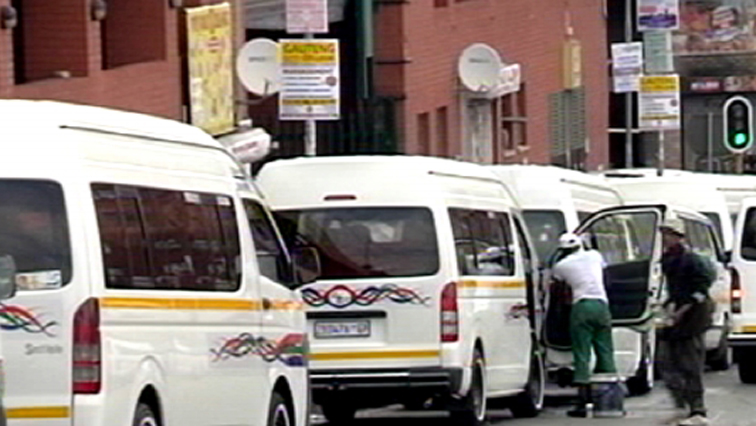Fights over money and territorial dominance, competition for executive positions within taxi associations, and the unlawful takeover of businesses are some of the contributors to taxi violence, according to the findings contained in a report of the Commission of Inquiry into Minibus Taxi Violence in Gauteng.
The commission was set up by Gauteng Premier David Makhura in September 2019 to probe the spate of taxi violence-related killings in the province.
The report states that taxi associations are not regulated under the current National Land Transport Act and have become a law unto themselves. It says they collect money from operators – money which is not accounted for and decide who joins the associations and where they can operate their minibus taxis.
Gauteng Transport MEC, Jacob Mamabolo, says there is also a battle for power and dominance. “The vehicles owned by the association and some powerful individuals in the association do not wait for their turn in loading lines. They simply move to the front when they arrive at the taxi rank which causes a lot of resentment from the general membership. The involvement of taxi associations in the business of taxi operations including the different money collection methods makes the incumbent executives resist vacating positions even where they have been voted out of office. In certain instances, monies collected are for the benefit of these executives.”
Gauteng Taxi Violence report recommends that officials involved be criminally charged:
Involvement of state officials
The taxi industry is among the most dangerous, if not most violent, and feared industries in the country. According to the report, between November and December of 2019, more than a dozen people were shot and killed with high calibre weapons hired by gunmen in taxi-related violence in Gauteng.
One of the inquiry commissioners, Hlula Msimang, says state officials are also involved. “Some police officials are involved in the industry by means of being operators and owners of taxis which is against the law. They operate through third parties or other arrangements which then hide their involvement in the industry. It is then possible that as operators and owners they are also involved in the ongoing violence. When the SAPS interacted with us, there were instances where state-issued firearms were found to have been involved in some of the acts of violence.”
The inquiry also found fault with the Provincial Regulatory Entity that deals with taxi operating licences in that applicants were not vetted for criminal records or pending cases. It found that there is also no monitoring for compliance after licences are issued.
The report says the current systems are weak and have enabled Gauteng transport officials to fraudulently issue operating licences to taxi associations. Mamabolo has vowed that officials within his department, past and present, involved in any irregularities including fraudulent registration of taxi associations and routes will be criminally charged.
“We have to clean the rot in the department. When I first came into the department in the taxi violence in Soweto, NANDUWE, and WATA that they were made to fight by government officials and I never understood what it means. We will now use the report to take action against the officials.”
Many have lost their lives in the industry:
Taxi Violence Unit
There are currently over 500 cases relating to taxi violence that have not been resolved and have stalled due to inept investigations. The inquiry has recommended that a newly capacitated and well-resourced Taxi Violence Unit be set up immediately to deal with these and other cases.
It also wants an innovative witness protection programme to be formed to encourage eyewitnesses to taxi-related crimes to come forward and not feel threatened. Whilst acknowledging the unorthodox and unique business model of the taxi industry, the report says the time is ripe for a fundamental and total transformation of the taxi business model.
Taxi organisation, Santaco, has welcomed the report. “We hope this is not just going to be a report, announcements and it ends there, we hope there’s going to be action on the recommendations,” says Santaco’s Bafana Mahlangu.
National Taxi Alliance’s Theo Malele says they are still acquainting themselves with the details of the report. “The National Taxi Alliance is busy applying its mind with a fine comb and also seeking legal advice where possible. “
Mamabolo has vowed to act on the report’s recommendations.
Gauteng government releases findings of the Commission of Inquiry into Taxi Violence:





